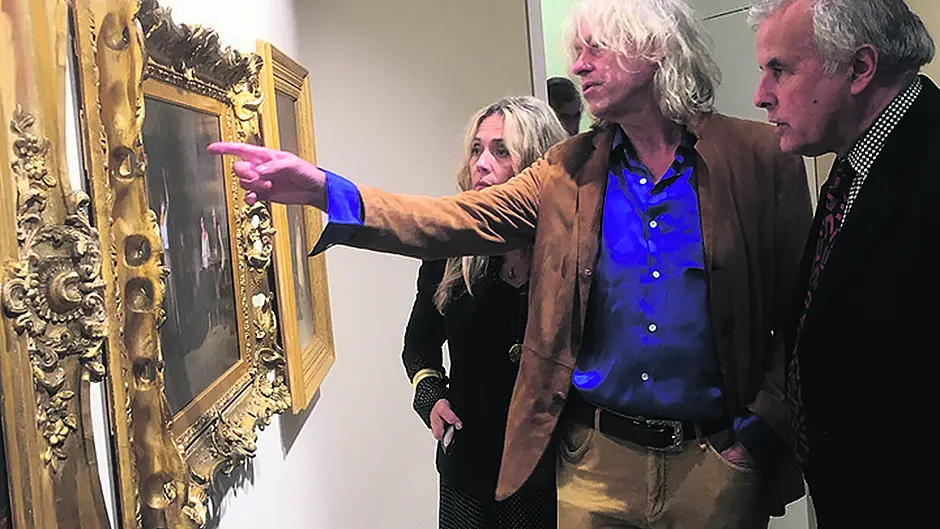The famine ‘has always been the birthplace of where we are – not that nonsense of 1916' Bob Geldof told a transfixed audience at the closing of the Coming Home exhibition
THERE was a bemused reaction to Bob Geldof’s comments made to The Southern Star last Saturday, regarding Coming Home, the famine exhibition at the West Cork Arts Centre, describing it as a ‘cut-down’ version of what was shown in Dublin.
‘The Dublin experience was so complete,’ he said, adding he had been unable to show his wife Jeanne Marine ‘more of the horrific stuff’ he had seen in the capital.
However, it has been confirmed by exhibition curator Dr Niamh O’Sullivan that all of the works – apart from three minor works – that were in Dublin Castle were in Uillinn, and Bob Geldof and his wife might not have seen the entire exhibition, which was shown over two floors – the ground floor and the mezzanine – at the West Cork Arts Centre.
Whatever the reaction to those comments, there is no mistaking the fact that Bob Geldof still has the power to provoke a visceral reaction in people – it was something that he ably demonstrated during the panel presentation Representing the Unrepresentable at the Town Hall last Saturday night.
He described his own reaction to Coming Home: Art and The Great Hunger – which is the world’s largest collection of famine-related art, and was on loan from Ireland’s Great Hunger Museum at Quinnipiac University in Connecticut – as being ‘astonishingly painful.’ As everyone knows, Bob Geldof is no stranger to famine and the pain it invokes. But neither, he says, are we. Bob Geldof is of the opinion the Great Famine has shaped us as a people and a nation.
Addressing a packed Town Hall, he said: ‘When we talk about the Irish famine, we talk about a country that evolved from that. That, for me, has always been the birthplace of where we are – not that nonsense of 1916.’
The famine – ‘that absolute cogent, human reality, where one world went and disappeared and a new one had to be invented, kept the memory of this existential national event alive, not in our heads, but in some mythic part of our soul, so when Band-Aid and Live-Aid happened it was no accident that this country pro rata allocated more than the rest of the world. There was an immediate association of the horror and the consequences of that resonate today.’
Bob Geldof said a study of famines had made it clear ‘that not only are we negotiating what we thought were imaginary ghosts, but we negotiate with actual ghosts’ because DNA is affected in any one year of famine.
He said: ‘It is not just the DNA of the victim, but inherited from then on. We have – and have had – a serious history of mental health depressions and a lot of people associate this back to this time beyond terror. And the resonances continue in every sense of culture, of art, or politics, but also in our DNA structures.’
Even today, he says, we live with its consequences. ‘We have this folk memory – what else explains our endless study of that terrible thing that completely changed us forever?’
When Bob Geldof says ‘famine is abhorrent and anti-life and anti what it is to be human’ he attempted to describe the end of life of a starving child.
‘A baby dying of hunger can’t make any sound anymore. The muscles have actually deteriorated so the muscles don’t work, so when you see a two-year-old, when you see these human beings, you must keep a grip on the notion that you are amongst human beings, because they don’t look like that and they don’t sound like that.
‘The sound is a low moaning. It is not a keen. It is a groan: very low, barely audible because the mouth can’t do that anymore. And if you pick up one of these humans, their heads seem magnified and their bodies barely exist. There is no weight. And the eyes are minted open. And when you lift up this human being beside the elegant, sentient parents who are in as much agony as any of you would be watching their child die.
‘To die of hunger is excruciatingly painful, but you can’t make any noise. There is no expression, just like it can’t be expressed through the media. And the final thing is that this human shits its life through your fingers, voids itself, and is gone.’
He said the rigours of what happens in a famine are so inexpressible that there is a sort of ‘intangibility to the whole experience.’ As a result, he said, Ireland is ‘full of ghosts and they tickle away at us because we haven’t remembered exactly. We have used the fact of the famine: the nationalists have used it; the economists have used it; the historians have used it; the politicians have used it.’
He said something is missing, ‘gone’, and ‘in that great national absence – in that huge psychological void – we had to reinvent ourselves.
‘An entire class of Irish people, who had spoken a different language, who worshiped a completely different god to the Catholic one that would soon be enforced upon them by Bishop Cullen. We no longer knew who we were. How could we? And yet the stories of the famine are so fascinating because it isn’t as we were told.
‘There were farmers who had become the bourgeoisie. Very few of them were affected. They were quite happy to see the peasant class be decimated. And it is not strictly true that the landowners were indifferent. In this area alone, four of the great landowners went completely bankrupt because for the three years they didn’t take their rents to try and keep their peasants going.
‘The stories that we conjure up for our own political end tend to obviate the obvious that this was mass carnage, but it wasn’t throughout the entire country: it was in spicks and specks and spots.
‘Famine,’ he added, ‘is the collapse of systems. It is the failure of being human to one another. To die of want in a world of surplus is not only intellectually absurd and economically illiterate, it is morally repulsive.’
Although Bob Geldof was first alerted to the horrors of famine through the media, he is now of the opinion that the ‘over-exposure of all of us to the constant media assault has rendered effect and sensation a nullity to the point where the activists and the NGOs try and make people alert to the crisis and ridiculousness of more humans dying of want in a world of surplus.’
Such exposure, he said, has become prurient: He said: ‘The 24-hour news cycle loves this shit because you can’t get enough of the Florida hurricanes, people crying, and dying babies.’ And he decried ‘the ubiquity of the web – with its 24-hour news cycle and its race to the bottom.’








